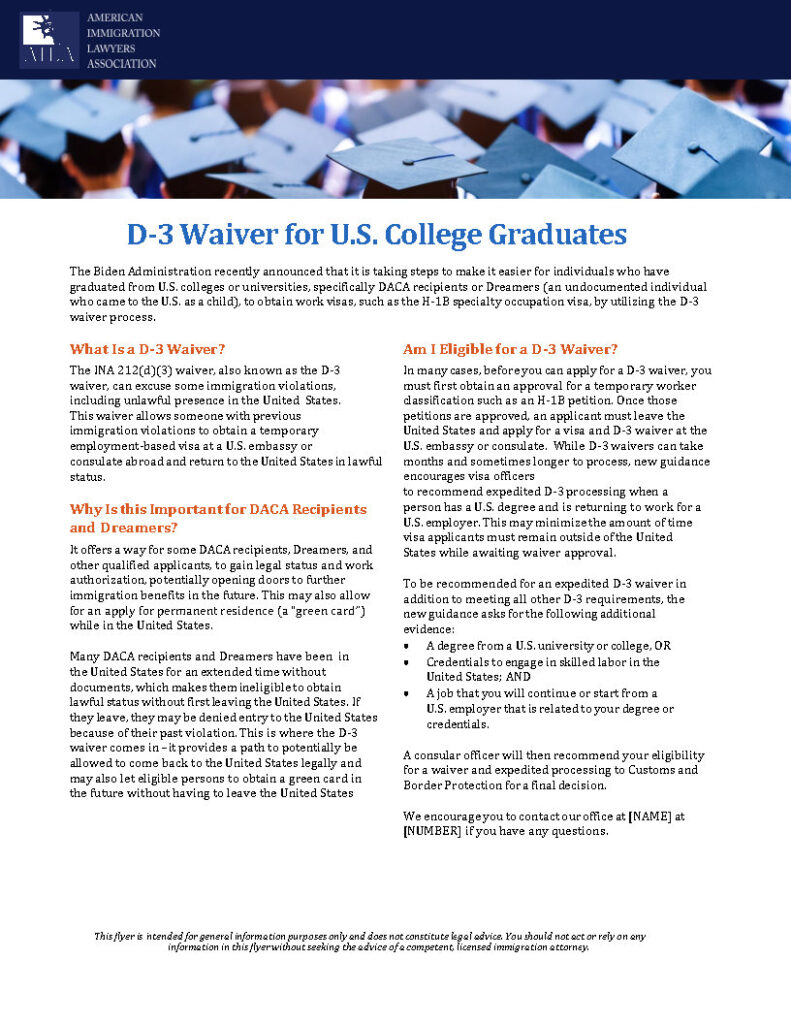Changes to 9 FAM 305.4-3(D) — Removal of Consular Consistency Requirement in 212(d)(3) Waiver Recommendations
On February 26, 2025, the U.S. Department of State’s Visa Office issued a significant update to the Foreign Affairs Manual (FAM), revising section 9 FAM 305.4-3(D) with major implications for the process of recommending INA 212(d)(3)(A) waivers. This revision removes the long-standing requirement for consular officers to ensure “consistency” when making waiver recommendations to the Department of Homeland Security (DHS), marking a significant shift in how these decisions are evaluated.
What Has Changed?
The primary change in the updated provision is the removal of the consistency requirement that previously guided consular officers when submitting recommendations for waivers. Under the previous version of the FAM, consular officers were expected to align their recommendations for waivers with those made by prior officers unless there was new derogatory information, a change in the applicant’s purpose of travel, or other circumstances affecting their eligibility under INA 212(a). This policy emphasized the value of maintaining consistency in decision-making.
However, as of February 26, 2025, the revised section of the FAM mandates that each recommendation for a waiver must be made independently and anew, with a fresh evaluation of all facts and circumstances. This means consular officers can no longer rely on or give undue deference to the recommendations made by previous officers.
Why the Change?
This update is part of a broader effort to implement the directives of the January 20, 2025, Executive Order Protecting the United States from Foreign Terrorists and Other National Security and Public Safety Threats. The Executive Order reflects the government’s renewed focus on national security and foreign threats, leading to a reconsideration of how waiver requests are handled.
What Does This Mean for Consular Officers and Applicants?
For consular officers, this change means they must take a more rigorous and independent approach when evaluating each waiver request. Officers will now need to review all available information and justify their decision to request a waiver, without relying on past recommendations from other officers.
Applicants may also see more variation in the decisions regarding waivers. While the change doesn’t guarantee approval or denial of waivers, it does make clear that each case will be evaluated on its own merits, with no automatic assumption that previous recommendations will influence the outcome.
Furthermore, it is important to note that the revised FAM language specifies that prior approval of a waiver does not guarantee approval for future waivers. This reinforces the idea that past decisions do not have a lasting effect on future outcomes and that each waiver request must stand on its own.
Revised FAM Provision: A Breakdown
Here’s a comparison of the revised 9 FAM 305.4-3(D) with its previous version:
Revised Version (Effective February 26, 2025):
9 FAM 305.4-3(D) (U) Prior Waivers and Weighing the Decision to Request a Waiver
(CT:VISA-2129; 02-26-2025)
- Each waiver recommendation must be made anew, independently, and based on all of the facts.
- Officers should not rely on or give undue deference to previous decisions.
- Each request must be accompanied by a supporting justification from the consular officer as the requesting official.
- Prior approval of a waiver does not guarantee that any subsequent waivers will be approved by the ARO (Adjudicating Regional Office).
Previous Version (Before February 26, 2025):
9 FAM 305.4-3(D) (U) Consistency in Requesting a Waiver
(CT:VISA-1982; 05-06-2024)
- Officers were expected to be consistent in waiver recommendations.
- If a waiver had been granted in the past for an applicant, the same recommendation should be made for future applications, unless new derogatory information, a material change in the purpose of travel, or other changes in circumstances were present.
- All requests were required to be accompanied by a supporting justification.
- Consistency did not guarantee approval by the ARO.
Impact on Legal Practice and Waiver Applications
This revision marks a critical change in the landscape of consular processing, particularly for legal practitioners advising clients on waiver requests. Attorneys representing individuals seeking INA 212(d)(3)(A) waivers will now need to be prepared for the possibility that each case will be scrutinized more closely and independently than before.
While previous consular decisions might have carried weight in the past, applicants must now be prepared for a more thorough examination of their individual circumstances. Legal counsel will need to present a well-supported, fact-specific case for each waiver request, reinforcing the importance of a detailed justification for the waiver.
Applicants who previously received a waiver may also face challenges in obtaining approval for future waivers, as past approvals no longer ensure future success. Attorneys will need to ensure that the facts of each case are fresh and persuasive, presenting clear evidence of the applicant’s qualifications for a waiver under the current national security and public safety guidelines.
For further updates on this change and how it may affect specific cases, schedule a consultation with CYA prior to scheduling your NIV interview.

